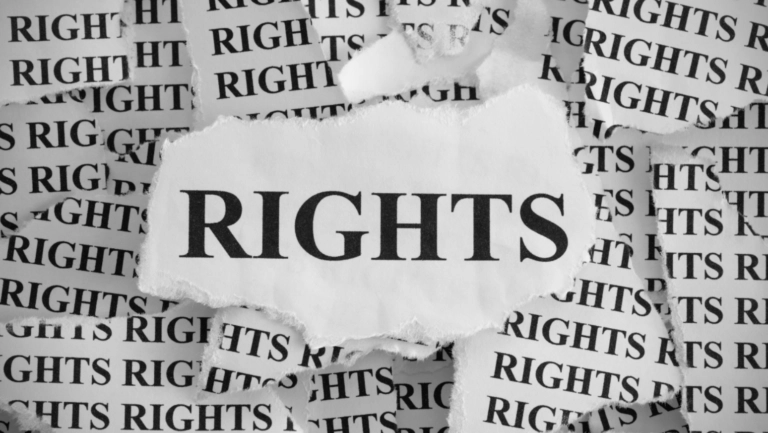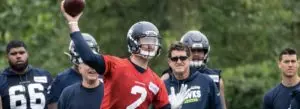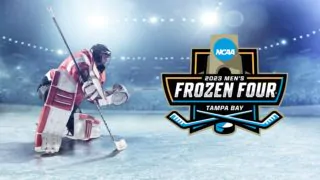Everybody seems to be against the NCAA these days, which, ironically, could turn out to be very good for college athletes. Last Thursday, Senators Chris Murphy (D-CT) and Bernie Sanders (D-VT) released the College Athlete Right to Organize (CARO) Act, which is a truly groundbreaking bill in the realm of athlete rights. The NCAA isn't a fan and quickly wrote a response heavily criticizing the bill on Thursday afternoon. What is the point of the bill and why is the NCAA so upset over it? Here are a five things to know:
- This bill would classify college athletes as employees under the National Labor Relations Board (NLRB) and, as the name implies, give them the right to organize and negotiate with their employers (their universities). It's the first bill of its kind to pursue employment status for college athletes, as many NIL bills (and the NCAA) explicitly state that college athletes should not be considered employees. The NLRB is important to college athletes here because back in 2014, when the Northwestern University football team attempted to unionize, the regional director of the NLRB in Chicago ruled that those athletes were technically employees based on the economic, contractual nature of scholarship agreements, coupled with the control exerted over them by their coaches constituted an employee-employer relationship with their university. However, Northwestern then asked the NLRB to reverse the ruling, because, among other reasons, the university argued that athletes' academics took precedence over their academics, and thus, athletes were not under ‘strict and exacting control' as outlined in the NLRB's brief. The NLRB then overturned its ruling in 2015, citing competitive balance, NCAA rules, and speculations that unionization in college sports would disrupt “stability in labor relations.” Then, in 2017, the NLRB released a memo stating that athletes at private universities should be considered employees, and while the memo doesn't reflect the full opinion of the board, it has since left the door of athlete employment status cracked open.
- Athletes are re-entering the employee conversation today thanks in large part to athlete rights advocacy efforts, and because many duties college athletes perform look a lot like legitimate labor. Under law, in order for individuals to be considered employees, the nature of their work must pass what is called the “common law test,” which is a list of standards individuals must meet to prove that the work they provide makes them employees, rather than, say, volunteers, contractors, or in this case, students. Under the common law test, if employers can tell employees how, when, where, and what to do in terms of their work, that might establish an employee-employer relationship. Other prongs of the common law test pertinent to college athletes are: Is training given to workers? Are workers under strict supervisor control? Does the employer determine not only how the job is done, but also who does it? Is the employer-employee relationship continual? Does the employer assign work hours? Is the work performed considered full-time? When considering the reality of coach-athlete relationships and time commitments involved in collegiate training and competition, it's logical to answer “yes” to many of these questions.
Another key factor of the common law test is payment received in exchange for services, which can apply to college athletes who are typically compensated by athletic scholarships. The CARO Act takes this into account and defines a “college athlete employee” as an athlete who “receives any form of direct compensation, including grant-in-aid, from the institution of higher education; and any terms or conditions of such compensation require participation in an intercollegiate sport.” But what about walk-on athletes and Division III athletes who don't receive athletic financial aid? This is where the NLRB steps in. Under the CARO Act, if an athlete can go to the board and prove that s/he is compensated in any way in exchange for their athletic skill, they have a shot at being granted workplace rights. So if a non-scholarship athlete receives free gear or plane tickets to travel, that athlete has a case, which is good! Walk-on athletes perform valuable services to their teams, like supplementing practice rosters, providing support to their teammates, and even contributing significant playing time in competitions, and DIII athletes often have schedules that are nearly, if not equally, as rigorous as DI athletes. The CARO Act could also extend to NAIA, JUCO, and even club sport athletes if they can prove they are being compensated for their sport.
- The CARO Act is unique because it's not regulating what athletes can and cannot do. Instead, the bill aims to treat athletes like the legal adults they are and give them the right to vocalize their needs and wants with legitimate backing. Instead of erecting guardrails around athletes' rights, the CARO Act would amplify their voices and allow them to legitimately ask for things that can enhance their work and school experience. To be clear, athletes won't be paid by their universities (unless perhaps an agreement is outlined in a future collective bargaining agreement), and organizing as workers could have numerous benefits to college athletes.
When most people think of labor negotiations in sports, they're likely to think of group licensing deals, revenue sharing plans, and even athlete strikes and league lockouts like we've seen in professional sports. But workplace rights extend far beyond these areas. For example, when the National Football Players Association launched in 1956, two big areas of concern for those athletes were access to clean uniforms and safer equipment, which were basic health and safety issues, and athletes eventually expanded their demands as time went on. College athlete employees could potentially do the same and bargain for higher-quality healthcare, mental health services, more time for their academics, more say in their travel schedules, and less coach influence on their academic choices. If a women's union ever launched, those athletes could potentially negotiate with their universities to make sure they comply with Title IX (lots don't) and ensure they have the same amenities and television exposure as their male counterparts. In 2020, The Women's National Basketball Players Association formed a social justice council and its latest collective bargaining agreement discusses maternity and childcare benefits, so the possibilities are virtually endless when it comes to negotiating.
- Hours after the CARO Act's release, the NCAA published a statement that staunchly opposed the bill. The statement reaffirmed the NCAA's stance that college athletes aren't employees, falsely stated that “many” athletes are awarded full scholarships (they're actually really rare), and that employee status would undermine the purpose of their education, even though some college athletes (and plenty of non-athlete students and graduate students) hold down jobs throughout their educational careers and NCAA policy books outline the detailed process that athletes must go through in order to obtain outside employment while remaining eligible. Perhaps most alarmingly was the second-to-last sentence, which stated that the NCAA “will continue to work with members of Congress to focus on issues that align with our priorities” (emphasis mine), rather than work with Congress to pursue its purported commitment to the well-being of college athletes.
- Why is the NCAA so upset? First, the current structure of the NCAA was predicated on the non-employment status of athletes, which helped the NCAA dodge lawsuits and made athletes easier to control via restrictive scholarship policies. If a coach can pull a scholarship for virtually any reason and athletes have little power to argue, it's easy to get athletes to fall in line. Thus, athletes without employee status and negotiating rights are vulnerable to manipulation, coercion, and abuse, which is why the NCAA should be in full support of the bill if it cares about athlete well-being. However, in the past, the NCAA has contended that it's not liable for athlete abuse and there aren't any enforceable rules against athlete abuse in the Division 1 Manual, so it seems that the NCAA's “priorities” are controlling, rather than empowering athletes.
However, what the NCAA doesn't consider here is the fact that this bill doesn't guarantee athletes anything—it's unlikely to pass and even if it does, athletes must take the lead in unionizing if they so choose. Unions aren't created overnight and doing so requires a multi-step process. Lots of things could go wrong. An athlete group could lose a union election. The NLRB could deny non-scholarship athletes employee status. Athletes in states that prohibit union activity might have to get involved with state courts. Union-busting is likely to happen—and this is all if the bill passes. The important takeaways are that the CARO Act is re-starting an important conversation that's unlikely to go away soon and it revealed the NCAA's true colors in the process.
The NCAA describes itself as “a member-lead organization dedicated to the well-being and lifelong success of college athletes,” but it's clear that an athletic association that's only interested in protecting its own priorities will never put athletes first. That's why 2aDays is dedicated to transparency, honesty, and athlete empowerment.
Katie Lever isn't a lawyer (so her articles don't constitute legal advice), but she is a former Division 1 athlete and a current doctoral student at the University of Texas who studies (and tweets about) NCAA discourse. Follow her to keep up with the NCAA on Twitter and Instagram: @LeverFever.
* Originally published on June 1, 2021, by Katie Lever, Ph. D







